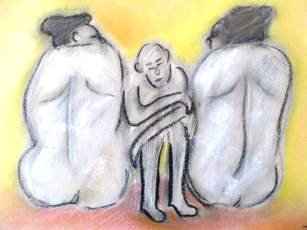The Dangers Of Distinct Dialogue

OK, I'm going to admit something: I'm a spy. When I recently photographed this pub scene in Ireland, I was actually on a secret mission, the people chattering around me none the wiser. That's right, I sneak around foreign places and eavesdrop. I make mental notes. I try to remember everything I hear.
What I'm trying to do is avoid the dangers of distinct dialogue. My current project is set in Dublin and I want to make sure that my Irish characters speak in a credible way, just like the average Bill and Bonny in a Dublin street. I would hate to think that the work is slammed later for having dodgy dialogue: words, phrases and expressions that nobody in Ireland would ever utter. This is actually part of the process I enjoy, so I don't see it as hard work. I look forward to getting together a little "dialogue group" in Dublin at some point in the future. I will call on Irish family and friends to read my work and highlight anything that doesn't ring true. I wouldn't dream of putting the work out there until this has been done. I bring all of this up because of some recent reviews I've seen of Lionel Shriver's latest book The Post-Birthday World. Rachel Cooke in The Guardian tears the book apart for many reasons, including the speech of one of the characters:
I bring all of this up because of some recent reviews I've seen of Lionel Shriver's latest book The Post-Birthday World. Rachel Cooke in The Guardian tears the book apart for many reasons, including the speech of one of the characters:
"I read The Post-Birthday World with a mounting sense of incredulity. Why did no editor step in to save Shriver from herself? It isn't only the broad strokes of her dual narratives that are silly; it's the detail that really lets her down (good writing can render almost any plot convincing, even, I suppose, one in which an American illustrator chats with Mrs John Parrot as their respective men toddle out to the baize). Ramsey Acton, for instance, speaks like no snooker player - no human being! - that you've heard before; one minute, he's a cockney of the Dick Van Dyke school ('It's queer how the thing what attracted you to someone is the same as what you come to despise about them'); the next he sounds vaguely - confusingly - northern (he uses 'you were' rather than 'you was' and calls women 'pet')."
Now, I don't need to tell you that Rachel Cooke's opinion is just one of many out there and she is not necessarily right. Yes, I often strongly disagree with reviews I read in the mainstream press. However, another review of the book brought up the same issue, although the overall verdict was a lot more favourable. Melissa Katsoulis had this to say in The Times:
"This is a compulsive, clever, wise and witty novel. There is, however, a fly in the ointment. And it’s a biggie. It is Ramsey’s bizarre Cockney patter. We eventually learn that he is actually rather middle-class, but having spent his whole life in snooker halls, among snooker people, he has adopted their way of speaking. Only nobody English speaks like wot he done. He starts almost every sentence with “Oi”, even romantic ones. Although South London born and bred, he calls women pets, fools, gobshites, and “hasn't a baldy” when he has no idea. Shite is confused with shit, tosser with wanker and, most alarmingly, not giving a monkey’s with not having one. These criticisms might sound petty – Shriver, who is based in London and New York, hasn’t been here long enough to gain an instinctive command of our English, and at least she has the guts to try, and to enjoy herself – but it is rare to be stopped in your tracks during the cleverest book you’ve read in years, by the stupidest thing you’ve heard in your life."
It has to be pointed out that the book has received much better reviews in the US, where the issue of the dodgy dialogue wasn't brought up. The New York Times critic Michiko Kakutani, who is renowned for her harsh reviews, described Shriver's novel as "engaging" and generally painted it in a good light.
When it comes to the whole thorny subject of detail in novels, some would say that a fiction writer shouldn't be bound by the constraints of reality. Why shouldn't they slightly deform the way a Londoner or a Dubliner speaks? It's fiction for goodness sake and lots of detail in the novel is imagined. Who really cares that distinct dialogue is not strictly portrayed? They have a point and I think the issue is not clear cut.
Oh, by the way, Shriver is the "chief fiction critic" at The Daily Telegraph, which means she often writes reviews about the work of her peers. She has written a wonderful article about the dangers she has opened herself up to with this new job. I also wonder whether reviewers at other papers might be tempted to give her a hard time because she is working for the "opposition", the "competitor". A novelist who was relatively unknown before the success of We Need To Talk About Kevin has suddenly become the chief fiction critic on a major newspaper. Her name and face is everywhere. That may irk some, make others a little bit jealous, no? Food for thought.











































13 comments:
Yep, there's a lot of food for thought there, but first before I forget: I can't see the photo. Is it Top Secret?
Right not back to what you've made me think of... I also grew up in South London and spoke a mixture of Sarf London/Mauritian speak. I sometimes come out with the odd drawl of those in the deep dark south west from my years down there. I left England 11 years ago and spend most of my time with people whose English is ANOTHER language and influenced by American English, I find myself saying 'I guess' instead of 'I suppose' or 'movies' instead of 'the pictures'. I spent a long time with a Northerner and had to think really hard about what was wrong with tosser and gobshite. Aaahh, what do I speak?
V, ah yes, the mish-mash of languages. I am also like you, melting together a joyful mix of Kiwi, Brit, Irish and French. This makes me wonder whether we can actually ever say that Cockney is this or that, or a Dubliner only says this or that. Re the photo. Try again! It's there on my page. :) Let me know if it stays secret - it shouldn't be.
I can see it in the Snapshot, but not on my page ): It looks small but kind of fun!
This is difficult territory because when someone pulls it off, and I do believe that Annie Proulx did-magnificently so, in "The Shipping News", you simply cannot imagine being trnasported to Newfoundland without their wierd abbreviated speech patterns. However, there have also been times when the dense colloquialisms and phonetic attempts at spelling/translating them have made it impossible for me to continue reading the thing. But if it's a good story, a GOOD story I'll persevere. And then there are times when you 'know' that this is the real voice of the author and then it seems to be okay.
I'm against translation into international/American English just to make it easier or politically acceptable though. I've been to the movies, the pictures and the flicks.
I can see it!
I think LM is right, I'm not sure that I've ever hated a book because of dialogue, but bad translations can really ruin a book.
Hi lmn,
yes, tricky dialogue that's written phonetically can be a real trial when it's overdone! a whole book in "code" can become tiresome, epecially when we just want to relax, escape, not make an effort. also, some books don't ease up and the phonetics don't become easier as you wade on through! good when it's good though!
V,
Great! I'm glad you can now see it! :)
"The sweat wis lashing oafay Sick Boy; he wis trembling. Ah wis jist sitting thair, focusing oan the telly, tryin no tae notice the cunt." -- Irvine Welsh gets it perfect in Trainspotting and keeps it up throughout the whole novel. I was convinced and stuck with it. I think it only becomes tiresome when it is done badly and you are struggling to hear correctly.
I cringe when TV programmes are set in Cornwall - you get a variety of south-west accents and no of them are ever correct and a book can be worse.
I think the best method is to hint at accent/dialect with the odd word to set a reader on the right path, not blow them out with an overload of language that often makes no sense - infuriating!
I have recently read Ardal O'Hanlon's 'The Talk of the Town'- in scanning over it again I realise that his Irish accent comes over loud and clear but it most from his writing 'voice' and style rather than any dialogue or specific colloquialisms (bugger, that's tricky word!).
One of the tricky things about reviews is how much is pure subjectivity and how much could be personal agenda.
The main thing about LS though is that Kevin was only picked up by Serpent's Tail after she received 30 (yes! 30!) rejections elsewhere!
Let that be a lesson to us all, eh?
Minx,
Yes, trainspotting was the book I was thinking of as well ... hard to click with straight away but then it sinks in and it's no longer an effort. I have had to write stuff in the style of a Frenchman speaking bad English ... very funny, but sometimes seems like an Indian speaking English. It's very hard to be get it right.
Debi,
Yes, that hornet's nest of reviews, reviewers and the reviewed, the links, the grudges, the inter-linked histories. What a muddle to sort out. Nothing is as it seems. :)
Hi Seamus,
I can understand where Rachel Cooke is coming from. It doesn't hurt to study things carefully because really, there should be no excuse for simple technical weaknesses.
I've noticed that sometimes when Caucasion writers write Asian stories, they tend to mix cultures up when these cultures are actually pretty distinct. Then you forgot the real genius of the book when you spot these flaws.
I say...wouldn't it be a great excuse to go back to Dublin again?
So you're right in the middle of novel-writing now?
btw, once more, I Looooooooooooove your banner. :-)
Dialog which doesn't ring true is deadly. That's wonderful that you go out on your spy missions. I know in myself that I yearn to get more down and dirty with writing. I want to put myself if the same kind of moment I'm writing about. The available material for description just explodes.
Your desire to capture the essence of actual communication is spot-on.
Hi Susan, you international traveller, you! :) Thanks for your thoughts on this topic, which seems to be an issue for all writers: striking balance, being true, not being too obsessed. I'm glad you like the banner, by the way. I'm settled on this look now. It's grown on me and I like having a lighter background. :)
Jason,
What is it, this vocation we have chosen, where we're forced to study people, make things up, get things right, be interesting, be sad, be happy, be unique? Gosh, what a tall order on so many levels. Let alone the dialogue of people we will never meet and from places we will never visit! :)
The background colour is pretty chic too, Seamus. :-)
Post a Comment